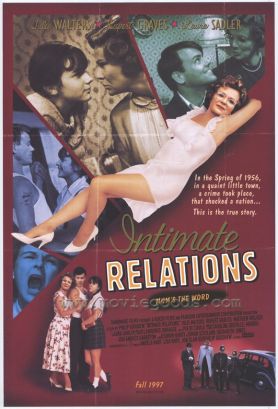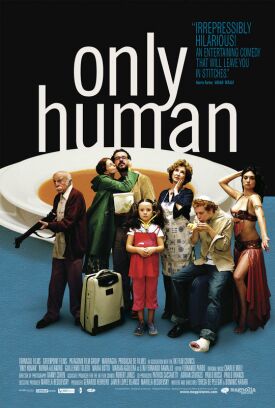Intimate Relations
Intimate Relations written and directed by Philip Goodhew is a lovely black comedy, supposedly based on a true story, which shines with brilliant performances by Rupert Graves and Julie Walters. Mr Graves plays Harold Guppy, a bit of a ne’er-do-well who, after stints in the Royal Navy and the Merchant Navy, comes to Abergavenny on the English/Welsh border sometime in the early 1950s to look up his sole relative, a brother called Maurice. Maurice’s wife, Iris, is hostile, but he likes the town and rents a room there in the home of the Beasleys — Marjorie (Miss Walters), a woman of near 50, her older husband, Stan (Matthew Walker), who is a one-legged veteran of World War I, and their youngest daughter, Joyce (Laura Sadler). Three older children have left home. Marjorie is the kind of woman who, when Joyce tells the family of how Sir Walter Raleigh’s widow went around with his head in her handbag for 30 years, says to her: “Joyce, sit down and eat your breakfast and don’t be common.”
Marjorie tells Harold to call her “Mum.” She also introduces him to the family boxer who’s called “Princess” after “Princess Margaret Rose.”
“But he’s a boy,” protests Harold.
“He doesn’t know that,” insists Marjorie. She goes on to explain that she sleeps in Joyce’s room, and that she and Stan sleep separately “for medical reasons.” Later that evening, Stanley tries to induce Marjorie to come into his bed, but she swiftly brushes him off. “You know I can’t risk intimacy, Stanley,” she says. “Be a man.”
Yet she soon shows herself more than ready to risk intimacy with Harold — who, happy as part of a family for the first time in his life, meekly and with a bad conscience agrees to satisfy her raging desires. To make matters even more complicated, Joyce soon finds out what her mother is up to and insists on sleeping with her and Harold as the price of her not telling her father. The ghastly comedy of this situation is made even more bizarre by Marjorie’s gargantuan capacity for denial. Her faith in the British class system and her own place within it is so unshakeable that she is incapable of believing that she has done anything wrong. As she says of Joyce and her friends: “They’re grammar school girls. Grammar school girls know how to behave.”
But Joyce is a much simpler creature than her mother, and she continues to use her power over her and Harold by threatening to tell on them. Harold finally bursts out at her: “If you say that one more time, I swear I’ll swing for you.”
Her mother says: “Don’t go on like that; you won’t grow up to be a lady.”
Poor Harold’s agonies of conscience are almost as funny as Marjorie’s complete lack of them. He tries to confide in his brother but cannot get the words out. Maurice, horrifies, begins to understand. “You don’t mean — It’s not [gasp], a Platonic relationship?”
“Yes. Every night for months.”
He tries to get away by joining the army — “I like being told what to do,” he says; “I’m used to it” — but Marjorie always manages to pull him back in. She is not a particularly handsome woman and far from charming, yet she has the irresistible force of a black hole. Even after Stan finds out what has been going on under his own roof, he is powerless in the end to hold out against the strength of her denial. It should come as no surprise that such an affair must end in violence, but the deftly handled comedy of the ending reinforces this brilliantly written and wonderfully acted film’s well-argued (if still, arguably, untrue) contention that, as Marjorie says, “Nobody wants the truth, Harold. . .The truth frightens everybody. It frightens the life out of me.”
Discover more from James Bowman
Subscribe to get the latest posts to your email.






